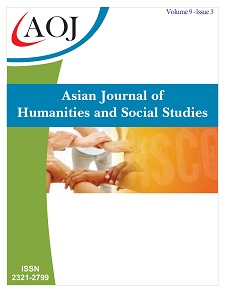Impact of Communication on Teachers’ Satisfaction and Productivity
Case of a Private School in Dubai
DOI:
https://doi.org/10.24203/ajhss.v9i3.6677Keywords:
Intervention-Research, Management Practices, Internal Consulting, Communication, Satisfaction, Socio-economic, High SchoolAbstract
The performance of every organization could be impacted by job satisfaction which is considered one of the most important issues. Dissatisfaction at work is considered a direct cause for excessive turnover which in turn affects the organization’s direct costs. One of the major determinants of job satisfaction is the lack of communication within the organization. This project highlights the importance of improving the communication between the management and the team members in order to increase teachers’ satisfaction and productivity. The project is conducted in a private international school in Dubai. Data is collected and analyzed qualitatively through semi-structured interviews, quantitatively through financial analysis and the socio-economic strategic implementation are constructing the whole process. The results of this study are communicated with the upper management team. Therefore, strategic and political decision are structured and socio-economic training tools are suggested to be implemented.
References
AI Hajar, Rim Kamal (2016). "The Effectiveness of School Principal Communication on Teacher Job Satisfaction" Theses. 455. United Arab Emirates University. College of Education. http://scholarworks.uaeu.ac.ae/all_theses/455
Cappelletti L., & Baker C., (2009). Developing human capital through a pragmatic oriented action research project. Action Research. SAGE Publications. 1-22. DOI: 10.1177/1476750309349976
Ciarniene R., Kumpikaite V., & Vienazindiene M. (2010). Expectations and job satisfaction: theoretical and empirical approach. ISSN 2029-4441 print / ISSN 2029-428X CD. doi:10.3846/bm.2010.131
Clarke K. (2016). Are teachers in Dubai overworked? Khaleej Times Education. Retrieved from: https://www.khaleejtimes.com/nation/education/teachers-are-you-overworked
Coghlan, D., & Brannick, T. (2005). Doing Action Research in your own organization (2 ed.). London: SAGE Publications Ltd.
Conbere, J., & Heorhiadi, A. (2011). Socio-economic approach to management. Organization Development Practitioner. 43(1): 6-10.
Gokulan D., (2018). Education in the UAE: Then, now and tomorrow. Khaleej Times: KT’s 40th ANNIVERSARY. Retrieved from: https://www.khaleejtimes.com/kt-40-anniversary/education-in-the-uae-then-now-and-tomorrow
Hanif N. (2016). Private schools face fight to survive amid competition. The National.
Kaabi A. A., (2005). FACTORS INFLUENCING TEACHER ATTRITION IN THE UNITED ARAB EMIRATES. University of Pittsburgh
Maidani, E. (1991-12-01). Comparative Study of Herzberg's Two-Factor Theory of Job Satisfaction among Public and Private Sectors. Public personnel management, 20(4), 441-448.doi:10.1177/009102609102000405
Manalel, J., & Joy, M., M., (2016). A Study on the Impact of Job Satisfaction on Employee Withdrawal Behaviours in Information Technology Industry. The International Journal of Business and Management. ISSN 2321–8916
Maslow, A. H. (1943). A Theory of Human Motivation. Classics in the History of Psychology. Psychological Review, 50, 370-396.
Moghadam, M. N. (2012-01-01). Diagnosis of Human Resources in Staff Departments of Kerman University of Medical Sciences Using a Three-Dimension Analysis Model : 2011. World Family Medicine Journal : Incorporating the Middle East Journal of Family Medicine, 10(1), 6-12.
Savall H., & Zardet V., (1987, 2008). Mastering Hidden Costs. Socio-Economic Performance: Research in Management Consulting. Information Age Publishing.
Savall, H. (2003). An up-dated presentation of the Socio-Economic Management Model and its International Dissemination. Journal of Organizational Change Management,n 16(1), 33-48.
Savall, H., Zardet, V., & Bonnet, M. (2000, 2008). Releasing the untapped potential of enterprises through socio-economic management, Genève : ILO-BIT 180 p.
Stello, C. M. (2010). Herzberg’s Two-Factor Theory of Job Satisfaction: An Integrative Literature Review. In Unpublished paper presented at the 2011 Student Research Conference: Exploring Opportunities in Research Policy, and Practice, University of Minnesota Department of Organizational Leadership, Policy and Development, Minneapolis, MN.
Taris W., T., Feij A., J., & Capel S. (2006). Great Expectations – and What Comes of it: The Effects of Unmet Expectations on Work Motivation and Outcomes Among Newcomers. International journal of selection and assessment. 14: 256-268. doi:10.1111/j.1468-2389.2006.00350.x
Thomas J. Kuieck (1980). A COMPARISON OF THREE OPERATIONAL DEFINITIONS OF JOB SATISFACTION. ProQuest Dissertations & Theses Global
Which School Advisor, (2016). NIS Review. Retrieved from: https://whichschooladvisor.com/uae/school-review/nibras-international-school
Downloads
Published
Issue
Section
License
Copyright (c) 2021 Alain Tannous, Veronique Zardet, Jeremy Salmeron

This work is licensed under a Creative Commons Attribution-NonCommercial 4.0 International License.
- Papers must be submitted on the understanding that they have not been published elsewhere (except in the form of an abstract or as part of a published lecture, review, or thesis) and are not currently under consideration by another journal published by any other publisher.
- It is also the authors responsibility to ensure that the articles emanating from a particular source are submitted with the necessary approval.
- The authors warrant that the paper is original and that he/she is the author of the paper, except for material that is clearly identified as to its original source, with permission notices from the copyright owners where required.
- The authors ensure that all the references carefully and they are accurate in the text as well as in the list of references (and vice versa).
- Authors retain copyright and grant the journal right of first publication with the work simultaneously licensed under a Attribution-NonCommercial 4.0 International that allows others to share the work with an acknowledgement of the work's authorship and initial publication in this journal.
- Authors are able to enter into separate, additional contractual arrangements for the non-exclusive distribution of the journal's published version of the work (e.g., post it to an institutional repository or publish it in a book), with an acknowledgement of its initial publication in this journal.
- Authors are permitted and encouraged to post their work online (e.g., in institutional repositories or on their website) prior to and during the submission process, as it can lead to productive exchanges, as well as earlier and greater citation of published work (See The Effect of Open Access).
- The journal/publisher is not responsible for subsequent uses of the work. It is the author's responsibility to bring an infringement action if so desired by the author.


